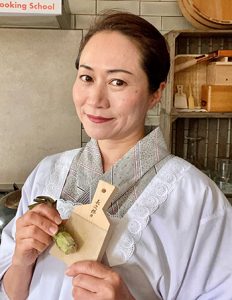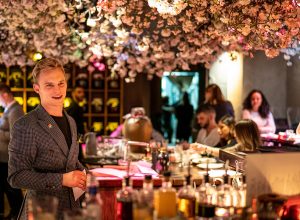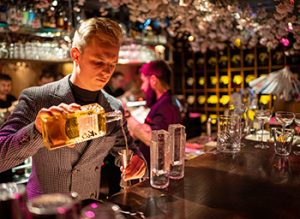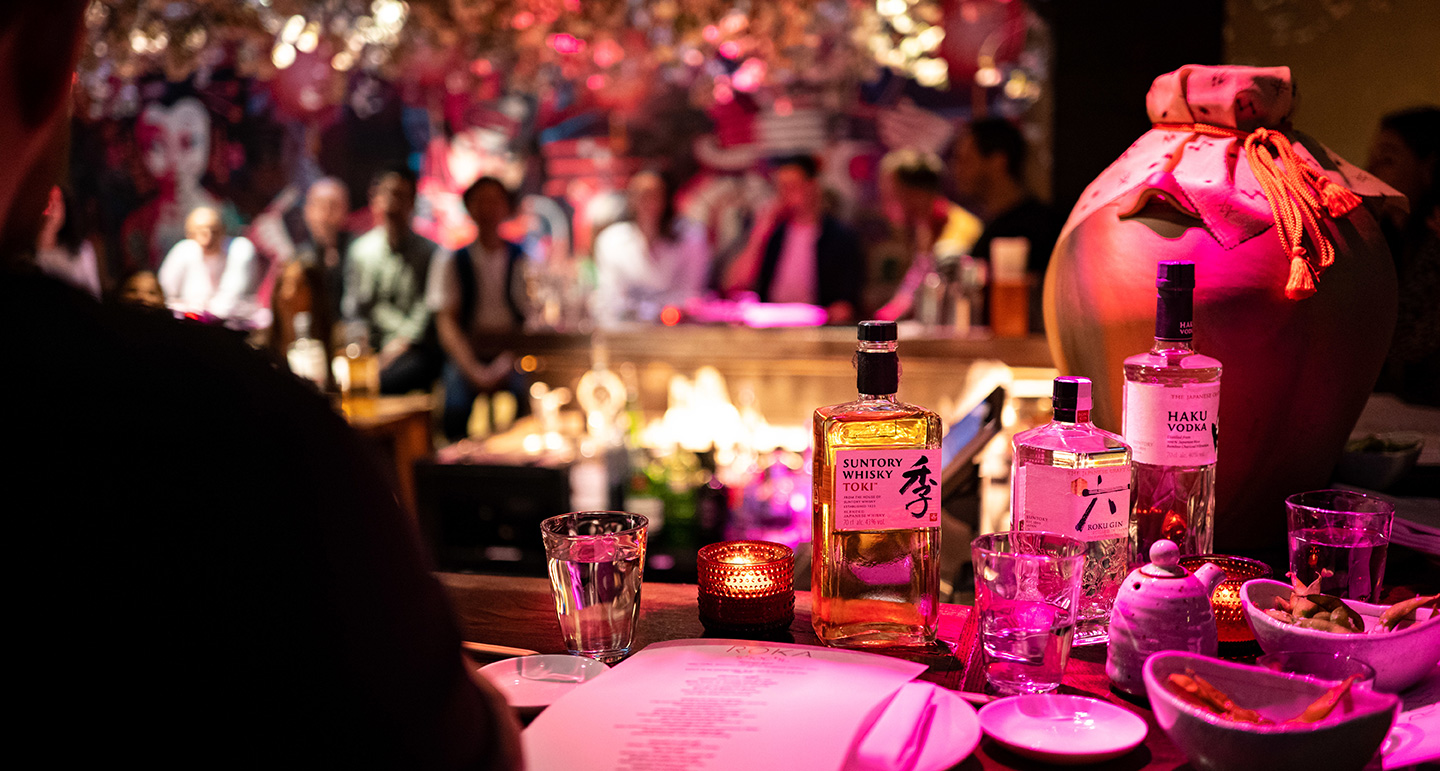The fascinating and intensive examination of Japanese bartending, spirits and culinary culture that is the House of Suntory’s DOJO Programme has returned for a third year and is now in full swing.
The bartenders in this year’s DOJO class are in the process of learning about the skills, techniques and philosophies that have earned the craft spirits and bartending culture of Japan admiration around the world. The DOJO masterclass sessions are led by masters in a host of subject areas related to Japanese hospitality. The first of these sessions explores flavour balance and seasoning. One of the Masters tasked with teaching the DOJO students this topic, which will be close to the heart of any bartender, is Izumi Nakamura.

Izumi, who was born in Amakusa, a beautiful chain of five islands located in the south of Japan, had an early career as a pharmacist, before backpacking around the world and then becoming a sushi chef and sake sommelier. Finally relocating to the UK, Izumi is now a cooking instructor at the Sozai Cooking School and Sushi Workshop in London, as well as running a catering company that specialises in the Japanese hospitality concept ‘Omotenashi’, a term the Michelin guide translates to mean ‘honest, no hiding, no pretending’ – a key pillar of The House of Suntory.
BarLifeUK were given the opportunity to put some questions to Izumi about the DOJO programme and we started out by asking what is it about Japanese bartending that holds such fascination for bartenders around the world, and what will this year’s students get out of the sessions?
“I believe that the typically delicate palate and hospitable focus of Japanese culture are becoming increasingly celebrated around the globe. For instance, everyone can benefit from respecting the culture of a Japanese tea ceremony, and through partaking in the DOJO programme, each bartender will be educated as to why it is important to have a holistic approach towards their events. In Japanese culture, it is important to pay attention to every detail and to be present in each moment. The DOJO programme offers an opportunity for some of the most outstanding professionals in their field to be immersed into our culture, providing them with learning and inspiration that will stay with them for a lifetime. Bartenders will gain a better understanding around how to delicately balance food and Japanese spirits, alongside learning how Japanese philosophies, everything from ways of viewing life and work, through to creativity, can influence bartending and the hospitality industry as a whole. For me personally, I want all participants to leave the programme with a heightened knowledge around such aspects, arming them with the knowledge that will ultimately aid their careers and grow their own skill set.”
Speaking of philosophies, the term Ichigo-Iche would probably come to mind for most UK bartenders when the subject of Japanese hospitality is mentioned, so I asked Izumi if that will play a part in the DOJO masterclasses.
“I’m recognised as a Master who understands ‘Ichigo-Iche’, which is the comprehension of purity and significance of every moment. DOJO is my opportunity to share the importance of ‘Ichigo-Iche’ and infuse its meaning within other cultures and industries. I’m so honoured to share my passion for the art of sushi making in this once in a lifetime opportunity with the DOJO students.”

Sushi-making is undoubtedly an art, and whilst I have interviewed chefs, I’ve never encountered a chef-pharmacist-sommelier before. It struck me that these three areas of expertise would combine to provide a deep and possibly unique insight into the relationship between ingredients and flavour, so I asked Izumi about creating flavour combinations in food and drink.
“It’s fun to create your own flavours and I’d say the best thing to do is to experiment and enjoy the experience as much as you can. However, I also love to let nature be. There are certain combinations of flavours that are tested and proven to work well together. However, you have to consider who is eating or drinking them and in what situation, before letting that guide you. If you can gauge the characteristics of the individual then you can begin creating something that you know will suit them.”
“I approach the different flavour depths and variations found in the main ingredient, just like you would with a high-quality perfume which has a harmonised top note, middle and bottom note. In Japanese cuisine, ’Suimono’ – a Japanese clear soup – is a good example. You first enjoy its beautiful aromas of dashi and rich umami, two complementary flavours that balance well together to enhance the main flavour. Then, the main star ingredient, in this case wandane,? is automatically enhanced through the depths of the surrounding ingredients, adding both flavour and aroma. Think of it as adding layers – while you don’t want to overshadow the main ingredient, you need to get the right balance to instead accentuate it. I try to take that technique and apply it to when I create new recipes.”
There are of course huge parallels or common skills found in both the kitchen and behind the bar, however seasoning is perhaps something that bartenders don’t consider in the same way a chef might. I asked Izumi if the principles are the same for cocktails as they are with food, and how this would be taught to the selected bartenders joining the DOJO programme this year.
“Yes, absolutely. When you create dishes and cocktails, you are the artist and it is up to you to take everything into account when developing your creation. This is what makes the DOJO programme so special, as it allows experts across multiple fields to see the world from another’s perspective, challenging the norms and practises that may have become second nature to them. I believe that the kitchen is a laboratory, and the chef or mixologist is the scientist. Of course, a great sake, cocktail or whisky will be enjoyable as perfect products in themselves. However, I’m more interested in their background, stories and situations. Yes, I’d consider pairing flavours with drinks and food, but also to the person who is having them. For instance, if I am cooking a meal for someone who has high blood pressure, I will use less salt.”

Following up on the parallels between the kitchen and the bar, I ask Izumi if there are any ingredients used in sushi that should be used by bartenders in cocktails, and how DOJO is significant in recognising these opportunities.
“Yuzu and ginger are common sushi ingredients, as is sea salt, umami packed konbu (kelp), sanshou, wasabi leaves, shiso leaves & flowers. There is an almost never-ending amount of inspiration cocktails could take from sushi. Hopefully DOJO will provide the perfect opportunity for our two worlds to collide and we’ll provide an abundance of new ideas for bartenders to then share with consumers across the UK. I’d advise bartenders to consider this magic number five: five colours, five tastes, five senses. Traditional Japanese cuisine makes use of five methods: preparation, raw, simmered, fried, steamed and grilled. It’s a technique that brings the best flavour out of the ingredients. I would also say don’t be afraid of making lots of mistakes. I have made plenty over the years, but have learnt something every time!”
Finally, and with a rumbling stomach after such a vivid explanation of food and flavour, I ask what part of the DOJO programme Izumi is most looking forward to, and with the sort of humility you’d expect from a true master. The answer? ‘Learning from the bartenders’.
“In the UK, my team and I are lucky to enjoy a plentiful amount of events all year round, and through these I’ve learnt a lot from the professional bartenders, especially around the variety of presentations possible for a sushi platter!
Thank you Izumi for sharing your time and thoughts with us! In the next interview, Ikebana and Aesthetics Master Keiko Smith speaks to BarLifeUK about Ikebana flower arranging and how to adapt it to cocktail garnishing, with a focus on Japanese aesthetics and beauty.
The DOJO Programme masterclasses kicked off in June and will continue until September, with the finale taking place in October. All sessions are being held at Japan House in London. For more details visit: www.suntorydojo.com/home


